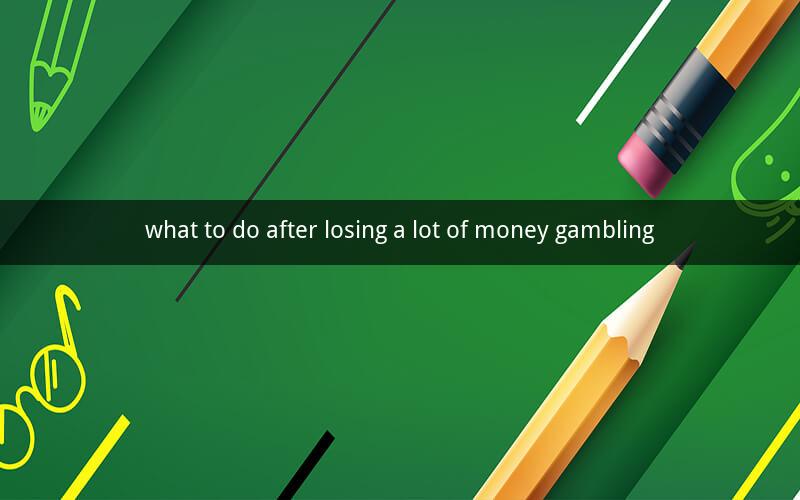
Table of Contents
1. Understanding the Emotions
2. Assessing the Financial Impact
3. Taking Immediate Action
4. Seeking Support
5. Financial Counseling
6. Rebuilding Credit
7. Setting New Goals
8. Avoiding Future Gambling
9. Legal Implications
10. Mental Health Considerations
1. Understanding the Emotions
Losing a significant amount of money through gambling can be a devastating experience. It's essential to acknowledge and understand the emotions you're feeling. Feelings of shame, guilt, anxiety, and depression are common. Recognizing these emotions is the first step towards healing.
2. Assessing the Financial Impact
Once you've come to terms with your emotions, it's important to assess the financial impact of your gambling loss. Understand how much money you've lost, the consequences of those losses, and how it has affected your financial stability. This assessment will help you create a plan to address your financial issues.
3. Taking Immediate Action
The next step is to take immediate action. This may include:
- Contacting creditors: Inform them about your situation and seek possible solutions, such as negotiating reduced payments or temporary forbearance.
- Freezing your credit cards: This will prevent you from further financial hardship.
- Selling assets: Consider selling non-essential assets to help cover your debts.
4. Seeking Support
Losing money through gambling can be an isolating experience. It's crucial to seek support from friends, family, or professionals. Sharing your struggles with others can provide comfort and guidance.
5. Financial Counseling
Financial counseling can be invaluable in helping you navigate the financial challenges you're facing. A counselor can help you create a budget, prioritize your debts, and develop a plan to get back on track.
6. Rebuilding Credit
Your credit score may have taken a hit due to your gambling losses. Rebuilding your credit is essential for future financial stability. Consider the following steps:
- Pay your bills on time: This will help improve your credit score.
- Keep your credit utilization low: Avoid using more than 30% of your available credit.
- Dispute errors on your credit report: If you find any errors, dispute them with the credit bureaus.
7. Setting New Goals
It's essential to set new goals to help you move forward. These goals can be financial, such as saving for an emergency fund, or personal, such as seeking a new job or improving your mental health.
8. Avoiding Future Gambling
To prevent future gambling problems, it's crucial to address the underlying issues that led to your gambling addiction. Consider the following steps:
- Understand the triggers: Identify what triggers your desire to gamble and work on avoiding those triggers.
- Seek professional help: If you believe you have a gambling addiction, consider seeking help from a therapist or counselor.
- Remove temptation: Delete gambling apps from your phone, unsubscribe from gambling-related emails, and avoid visiting casinos or gambling websites.
9. Legal Implications
If your gambling losses have led to legal issues, such as fraud or theft, it's important to address these promptly. Consider seeking legal advice to understand your options and the potential consequences.
10. Mental Health Considerations
Losing a significant amount of money through gambling can take a toll on your mental health. It's crucial to address any mental health issues you may be experiencing. Consider the following:
- Seek therapy: A therapist can help you cope with your emotions and develop coping strategies.
- Practice self-care: Engage in activities that promote relaxation and well-being, such as exercise, meditation, or hobbies.
- Join a support group: Connecting with others who have experienced similar challenges can provide comfort and guidance.
Questions and Answers
1. What are the first steps to take after losing a significant amount of money through gambling?
- The first steps include understanding your emotions, assessing the financial impact, and taking immediate action to address your debts and financial issues.
2. How can financial counseling help you recover from gambling losses?
- Financial counseling can help you create a budget, prioritize your debts, and develop a plan to get back on track, providing guidance and support throughout the process.
3. What are some strategies to avoid future gambling problems?
- Strategies include understanding the triggers for your gambling, seeking professional help for addiction, and removing temptation by avoiding casinos and gambling websites.
4. How can you rebuild your credit after gambling losses?
- You can rebuild your credit by paying your bills on time, keeping your credit utilization low, and disputing errors on your credit report.
5. What are the legal implications of losing a significant amount of money through gambling?
- Legal implications may include fraud or theft charges if you've used illegal means to finance your gambling or if you've committed other illegal acts related to your gambling.
6. How can you address the mental health issues that may arise from gambling losses?
- You can address mental health issues by seeking therapy, practicing self-care, and joining a support group to connect with others who have experienced similar challenges.
7. What is the role of friends and family in helping you recover from gambling losses?
- Friends and family can provide emotional support, practical advice, and encouragement throughout your recovery process.
8. How can setting new goals help you move forward after losing money through gambling?
- Setting new goals can help you stay focused and motivated, providing a sense of direction and purpose as you work towards financial and personal recovery.
9. What are some common emotions experienced after losing money through gambling?
- Common emotions include shame, guilt, anxiety, and depression, which can be addressed through therapy, support groups, and self-care practices.
10. How can you protect yourself from future gambling-related financial issues?
- You can protect yourself by understanding the risks of gambling, avoiding high-risk situations, and seeking help for any underlying issues that may contribute to your gambling addiction.